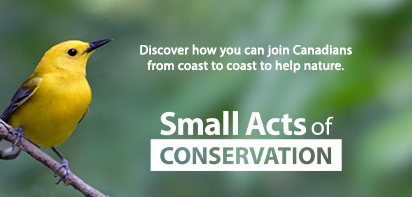The Acadian Peninsula
The Nature Conservancy of Canada (NCC) has been working with communities in the Acadian Peninsula since 1993 to help identify and protect some remarkable places to which people share a connection.
NCC's stewardship and conservation activities that focus on the conservation of the natural beauty of this special place has helped foster a sense of community pride among local residents.
The Acadian Peninsula at a glance
Located on New Brunswick’s northeast coast, the Acadian Peninsula has some of the most significant undeveloped habitat found anywhere in the Maritimes. Because of the beauty and recreational value of coastal areas, there is a growing demand for these lands and development pressures are increasing.
The Nature Conservancy of Canada is active here in many communities, with more than conservation 30 projects.
Conservation values
The Acadian Peninsula features spectacular and productive wetlands, peatlands, coastal habitats and white barrier beaches that benefit from carefully managed land use practices such as ecotourism. The area also contains eight Important Bird Area sites as well as a Ramsar Wetland of International Importance.
The sandy beaches on the region provide critical nesting habitat for the nationally endangered piping plovers. There are only 6,000 of these birds remaining in the world.
Other important species in the area include:
- black-crowned night heron
- great blue heron
- double-crested cormorant
- common tern
- maritime ringlet
- Gulf of St. Lawrence aster
Threats
The usage of all-terrain vehicles on the beaches has increased in recent years. ATVs have the potential to disturb nesting piping plovers, which may lead to nest abandonment and lower productivity. ATV traffic in the bogs destroys the vegetation, causing long-lasting scars on the surface. However, the main threat for peatland is peat extraction. Sea level rise also has the potential to affect coastal areas, which results in an increased rate of erosion.
Our vision for the Acadian Peninsula
Major goals for NCC in the Acadian Peninsula would be to maintain the ecological integrity of the coastal systems and bogs and to build on existing work with partners in order to maximize positive impacts on landscapes. NCC will also work to promote compatible ecotourism and stewardship on public lands in order to reduce habitat disturbances.
Focal areas in the Acadian Peninsula
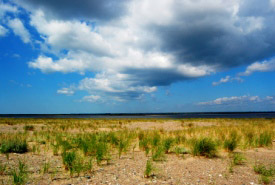
Tabusintac beach, NB (Photo by NCC)
Tabusintac
Tabusintac is NCC's flagship site in northeast New Brunswick and encompasses an area of 452 hectares (1,117 acres). NCC has been working here since 1993. So far, NCC has acquired 18 parcels in the area through land donations and purchases.
The Tabusintac Estuary is a beautiful natural area that offers a safe haven for a wide variety of waterfowl and shorebirds.
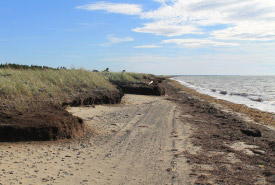
Miscou Island Nature Reserve, NB (Photo by NCC)
Miscou Island
NCC currently owns 243 hecatres (600 acres) on Miscou Island and has been working in this area since 2006. Miscou Island is last point of land before the extensive flight piping plovers undertake during their migration.
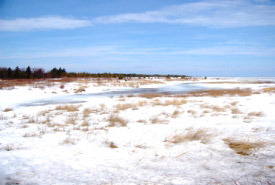
Neguac Nature Reserve, NB (Photo by NCC)
Neguac
The Nature Conservancy of Canada protects two sites in Neguac, consisting of coastal bog, forest, estuary and low-lying barrier-dunes. Coastal bogs are significant for many species and are an important part of New Brunswick's landscape.
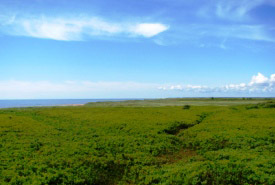
Pokemouche Nature Reserve, NB (Photo by NCC)
Pokemouche
NCC's nature reserve in the Pokemouche community, approximately 20 kilometres southeast of Caraquet, holds 77 hectares (189 acres) of protected habitat. Pokemouche is a system of barrier beaches and dunes and is also an important piping plover and waterfowl nesting site.
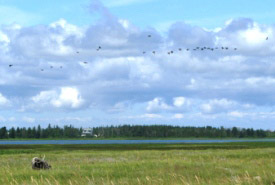
Pointe-à-bouleau Nature Reserve, NB (Photo by NCC)
Pointe-à-Bouleau
NCC has been proudly working at Pointe-à-Bouleau since 2004, with a nature reserve less than five minutes from the Town of Tracadie-Sheila. The low-lying sand dunes, mudflats and salt marshes make for a great habitat for the piping plover.



